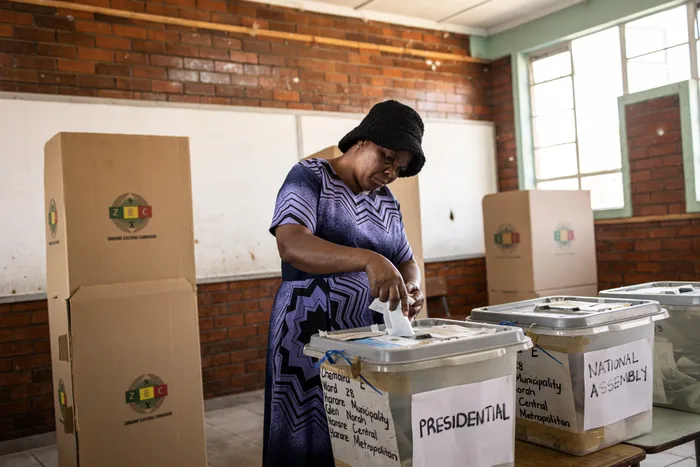Zim poll shambles ratchets pressure on observer missions

Picture: John Wessels/AFP - A voter casts her ballot at a polling station during the presidential and legislative elections in Harare, on August 24, 2023.
Picture: John Wessels/AFP) - Fabio massimo Castaldo, Chief Observer of the European Union Alection Observation Mission in Zimbabwe addresses a press conference in Harare on August 25, 2023.
By Dr Sizo Nkala
“A new low”, “the worst elections in history” – this is how most Zimbabweans have described Wednesday’s harmonised national elections.
They went to the polls on August 23 to cast their votes in the country’s harmonised elections to vote for the president, parliamentarians, and local councillors. However, no one was quite ready for what was to transpire as voters made their way to their respective polling stations. Numerous polling stations in opposition strongholds such as Harare and Bulawayo, the country’s largest and second largest cities respectively, were not able to open on time as the Zimbabwe Electoral Commission (ZEC) officers stationed in those polling stations claimed that there were no ballot papers. Some polling stations had ballot papers for the presidential and parliamentary candidates but none for the local authority candidates. Other polling stations had no ballot papers at all.

In yet other polling stations, ballot papers were not enough, and voting had to stop after a few people cast their votes. Due to the shortage of ballot papers, many polling stations failed to open at 7am which was the official opening time.
According to a statement released by ZEC, only three provinces namely Masvingo, Matabeleland North and Matabeleland South had all of the polling stations open at 7am. In Midlands and Mashonaland West 99% of polling stations opened on time while in Mashonaland Central and Mashonaland East 95% of polling stations were open at 7am. The worst affected provinces were Manicaland, Harare and Bulawayo where 85%, 0% and 23% of polling stations respectively managed to open on time. The ZEC attributed the chaos to delays in printing the ballot paper as a result of pre-election court challenges, especially in Harare and Bulawayo. The commission said that it would ensure that all affected polling stations would be open for 12 hours as required by the law.
However, this explanation raised more questions than answers. It boggles the mind why ZEC had to wait until the day of the election to tell the public that there was a shortage of election material. To add to the confusion, a few days before the elections ZEC had issued a statement informing the public it had printed enough ballot papers including contingency ones to be used in the elections. The sudden claims that there was a shortage of ballot papers left many baffled. One gets the impression that there is no truth in the ZEC statement about the reasons for the shortage of ballot papers. The only plausible explanation is that the ZEC, which is led by ruling party sympathisers, is being used to suppress voters in opposition strongholds. The intention is to have many voters lose their patience and go back to their places without casting their votes.
The delay in the opening of polling stations saw some polling stations only commencing the voting process as late as 9pm which meant that voters had to vote throughout the night. Voting at night in poorly lit polling stations undermined transparency and paved the way for electoral malpractices. Some polling stations failed to open at all and voters had to spend the night there waiting to cast their votes. President Emmerson Mnangagwa issued an unprecedented proclamation extending the voting period to Thursday for 40 polling stations in Harare, Manicaland and Mashonaland Central provinces.

Moreover, some voters were turned away for various reasons but mostly after failing to find their names on the voters roll of their polling stations. Some patient voters later found their names in other polling stations. All this points to ZEC’s incompetence and ill-preparedness to manage the elections.There were also incidents where some candidates, especially from the opposition, were missing from the ballot papers despite having successfully filed their nomination papers with ZEC.

In what was widely seen as Zanu-PF attempts to intimidate the voters, pairs of Zanu-PF members were seen across the country sitting with desks covered in Zanu-PF regalia outside polling stations. It is reported that they were illegally taking down the details of every voter coming to cast their vote. Most of them had to be asked to move by the ordinary citizens as the police seemed unwilling to remove them. If the aforementioned incidents are anything to go by, this election is turning into yet another sham election devoid of any credibility. It is an indictment on the competence of ZEC and its fitness for purpose.
The ball is now in the accredited election observers’ court, especially the election observer missions of the Southern African Development Community (SADC) and the African Union (AU) to play their role and produce objective reports on the Zimbabwean elections. It is also crucial that the opposition parties gather evidence they can present in the courts in the event that they dispute the outcome of the elections in the courts as happened in 2018. At the time of writing, counting of the votes had commenced in some polling stations with the main opposition CCC and the ruling Zanu-PF picking up some parliamentary seats.
Dr Sizo Nkala is A Research Fellow at the University of Johannesburg’s Centre for Africa-China Studies